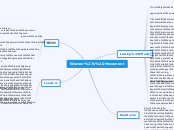Women's Movement
Lasting Effects
Civil Rights Act 1954
opportunities expanded
Title VII outlawed discrimination in the work place
Equal Employment Opportunity Comission enforce the federal prohibition on job discrimination
Higher Education Act banned discrimination in the workplace
Roe v. Wade assured women the right to an abortion
women in the workplace has grown 30% in the 1950's to more than 60% in 2000
most of the nations poor people are single women (lowest paying jobs, fewer benefits)
Pink Collar jobs- jobs that women dominate typically and pay less
Glass ceiling- the resistance and things women do not have that they can see that men have
Equal Employment Opportunity Commission (EEOC) forces civil rights laws against workplace discrimination
Equal Credit Opportunity Act (ECOA) unconstitutional to discriminate against any applicant
Commission on the Status of Women promotes gender equality and the empowerment of women
Resistance
Phyllis Schlafly- denounced women's liberation, the Equal Rights Amendment (ERA), which guarantees gender equality under the law, fell 3 states in the ratification process for becoming a constitutional amendment under her support. She thought it would ruin the family, it would be unconstitutional to have single sex bathrooms and women might be drafted in the military
Goals
second wave feminism- political, social, and economic equality of men and women
gender equality
more opportunities than just a housewife
equal treatment in the workplace between men and women
Consciousness raising focuses the attention on a bigger group of the same condition
Leaders
Betty Friedan established the National Organization for Women (NOW) which is "true equality for all women" and "full and equal partnership of the sexes". It broke down discrimination and attacked stereotypes. Feminine Mystique was written by her credited for sparking the second wave feminism
Gloria Steinem- was under treatment of humiliation. She wanted to protect social custom of identity. Wanted women to be seen as hard workers and individuals. Created by Gloria Ms magazine was about feminist issues and how to interview for a job
Sandra Day O'Connor- first US supreme court Justice
